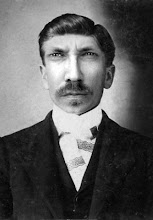 Last week, Criterion issued a DVD version of Paul Schrader's Mishima. The restoration is crystal clear and the extras, typical of Criterion, are fantastic. Watching Mishima you wonder how it ever got made. A Japanese cast in a subtitled art movie about a conflicted gay writer who ends his life by ritual suicide isn't the most commercial proposition. It couldn't have been at the time the movie was released, either, over two decades ago. And yet it feels completely new. A kinetic sculpture of identity in flux, it feels more future than past. Schrader has always had an interesting take on biography:
Last week, Criterion issued a DVD version of Paul Schrader's Mishima. The restoration is crystal clear and the extras, typical of Criterion, are fantastic. Watching Mishima you wonder how it ever got made. A Japanese cast in a subtitled art movie about a conflicted gay writer who ends his life by ritual suicide isn't the most commercial proposition. It couldn't have been at the time the movie was released, either, over two decades ago. And yet it feels completely new. A kinetic sculpture of identity in flux, it feels more future than past. Schrader has always had an interesting take on biography:"You have an obligation to history and you have an obligation to drama," he said in an interview with Salon (2002), "and you've got to find a way to serve both masters. If you have to cheat history to tell a story, you shouldn't make that movie, And if you have to tell a boring story to be true to history, you shouldn't make that movie. So when you achieve a situation where both drama and history are being served, the line between fact and fiction then blurs because your protagonist is a factual character who has the power of fiction."
Like Todd Haynes, who must have seen and been influenced by Mishima, Schrader presents biographies which are more about the popular conceptions of their subjects and their histories than close-minded, airtight assertions of fact. Both filmmakers employ a visual syntax which mimics the media used to create the myths they depict. Mishima includes segments which tell the story of Yukio Mishima through his writing, establishing his character through the fictions he created. Like any writer's self, Mishima's was a fiction to some extent to begin with, a matter of projection and accretion; like his pen name, assumed. Other segments use Ozu-like black and white to tell the story of the writer's childhood. Various actors play Mishima in these iterations, and eventually they all start to resemble each other, so that you're never sure at any given time whether you're watching an actor from one segment or another, the "real" Mishima, the "fictional", or something in between. It doesn't matter: all conflate, canceling each other out to create yet another presence, an absent figure residing somewhere in the mind. Haynes does similar things by different means in I'm Not There, where different conceptions of Dylan are played by different actors, in totally different milieus. Dylan exists somewhere in the blank spaces like a trace image on a white wall.
Mishima's homosexuality is all subtext in the movie, which seems odd at first, then perfectly apt. It isn't just that his estate (wife and children) forbid depiction of the more salacious aspects of his life. Mishima forbade himself. Raised in a strict, even punitive environment, he carried this as a convoluted form of masochism into his adult life. His relationship to his body was intensely intimate and simultaneously detached. His body--but also an object, to be sculpted as a raw material. His mind, but a weakness taking root in the form of thought and emotion, to be mastered, denied, banished, transformed. He had a following of young men he possibly never touched, and yet their relationship to him was excessively erotic. As novelist Susanna Moore commented to Schrader when discussing the relationship between Bob Crane, the subject of Schrader's bio-pic, Auto Focus, and his male cohort in hardcore video-making, "You know, whenever there's more than one penis in the room, any sexual act is a homosexual act." There's plenty of ass in Mishima, it's just that the subject doesn't allow himself or the story to enjoy it.
Add to this Schrader's own Calvinist upbringing and his admiration of Robert Bresson and you begin to see why he was the ideal biographer for Mishima. Who understands the mindset of disavowal better?
The score for Mishima was composed by Phillip Glass and might be the best work he's ever done.




No comments:
Post a Comment